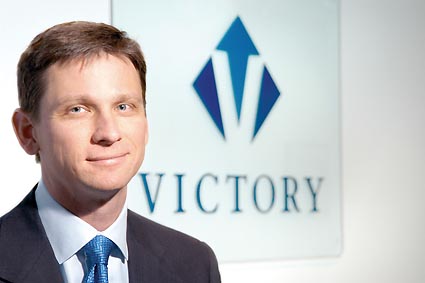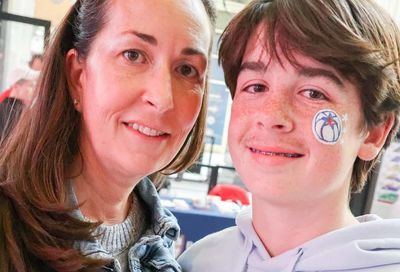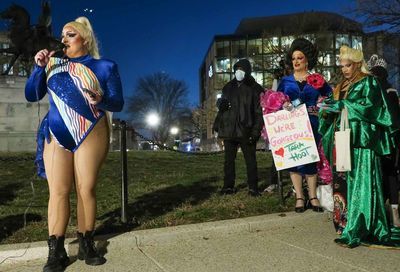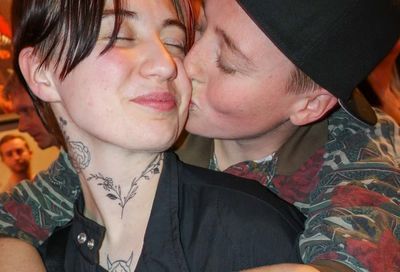On the Ballot
Chuck Wolfe and the Victory Fund bring gays and lesbians to the political party
“Remember those commercials, ‘Give it to Mikey, he’ll eat anything’?”
Chuck Wolfe laughs as he describes his early political days as the openly gay member of the late Florida Gov. Lawton Chiles’ administration. Wolfe was something of an eager beaver, a reputation that got him what he calls some of “the greatest jobs possible” during his years there including director of external affairs and director of tobacco control.
“It was ‘Give it to Chuck, he’ll do any job,'” Wolfe says.
That eagerness to work and earnestness of purpose are what led Wolfe, 42, to his current job at the helm of the Gay and Lesbian Victory Fund, overseeing the group’s efforts to support and elect gay and lesbian political candidates in local, state and federal elections across the country. Before taking on that charge, he served as the head of the American Legacy Foundation, the public health group that was formed after the tobacco industry settlement, and where he helped create anti-smoking efforts, including the ubiquitous and striking TRUTH campaign.
Since he joined the Victory Fund just one year ago, the country has seen the Supreme Court overturn sodomy laws, Massachusetts move to offer gay marriage, and a high-profile effort to amend the Constitution to ban gay and lesbian marriage.
So this election cycle is of great importance for the GLBT community, in part because state legislatures in the coming months and years will be dealing with gay issues on an unprecedented scale. Wolfe says having gay and lesbian officeholders at the table is vital to the success of the community.
“Once people serve with an openly gay or lesbian officeholder, they become comfortable and knowledgeable,” he says. “That’s the way politics work — it’s the relationships that get things done. If we truly want equality, it’s going to happen because we’re sitting there at the table with these relationships and able to get things done.”
 |
METRO WEEKLY: Looking at candidates you’re working with in this year’s elections, what are some of the biggest issues and challenges facing them outside of the marriage issue?
CHUCK WOLFE: If we’re excluding marriage, the challenges aren’t much different in 2004 than they were in 2003 or 2002. Obviously, issues of sexual orientation have been elevated whether you’re talking about the Supreme Court sodomy decision, hate crimes or anything else. All of those issues continue to be elevated, and most of that is from our brother and sister organizations who are actively lobbying on those issues and raising them to the forefront. The bigger issue for our candidates is geographic — where they’re running and whether the electorate has been well-educated about the fact that there is no difference in sexual orientation when electing a public official.
So in the thirteen states in the country with no gay or lesbian elected officials, what kind of education is needed for the electorate to get them past the question of sexual orientation? And how do we train candidates to make sure they are completely at ease with how to answer questions that come up about it? So we spend a lot of time training potential candidates and senior campaign staff. No candidate’s private life, sexual orientation, or family life should be the defining factor of an election. An election should be about their stands on the issues and how good an officeholder they will be.
MW: Is there a geographical concentration of those states?
WOLFE: The South and the Midwest, and also include Alaska and Hawaii in that mix.
MW: So we’re looking at fairly rural, non-urban areas as compared to the coasts?
WOLFE: For any change that has occurred over time in our country, you would probably see a similar trend on where change happens first and where it follows. You’re seeing the same thing happen on the election of gay and lesbian officeholders. And you’re also seeing pro-gay policies follow that same trend. The greatest example we can have right now is where you’re seeing more pro-gay activity on the issue of gay and lesbian marriage.
MW: How many candidates has the Victory Fund endorsed this year in those thirteen states?
WOLFE: Two candidates [as of now], in Idaho and Indiana. We’re talking to a number of others as well.
MW: What has been the impact of the gay marriage issue for your candidates at this point in the year?
WOLFE: The best impact is that it increased interest by gays and lesbians to run for office. There’s been an increased involvement in the political process. For a lot of organizations that means increased fundraising, but for us it also means identifying more candidates. We’re very excited about that. The more quality candidates we have running for office, the better off everybody is.
MW: Has there been a downside to the issue for the candidates you work with?
WOLFE: We’ve had a lot of discussion about whether we’re going to see some kind of backlash against gay and lesbian candidates. We have not seen that yet — in the first two months of this year, eight out of ten of our endorsed candidates won either primary or general elections. And for the two folks who did not win, it had nothing to do sexual orientation — they were new candidates, and oftentimes the first campaign is the most difficult. So we haven’t seen any backlash yet. We’re certainly preparing for it, but at this point we haven’t seen it.
MW: One perspective on the marriage issue seems to be that it’s the biggest and most important political battle ever, while some seem to believe that the whole amendment issue will never be able to pass Congress and is more for show than for actual implementation. Is there a middle-ground approach between those two viewpoints?
WOLFE: I think your question kind of stems from what are the best lobbying techniques on the marriage amendment. We don’t lobby elected officials, which makes us a little different from some other organizations. We will share the information that the lobbying organizations develop with our elected officials and candidates. One of the things to remember, especially here in Washington where we get very concentrated on the federal part of the election, is that there are 511,000 elected positions in this country and only five hundred-plus of them are federal. The rest of them are local elected officials. There are about five thousand state legislative or state offices, so that leaves 505,000 that are at the local level. That’s where most of our endorsements go.
So while we’re thinking about what the middle ground might be in the United States Congress, they’re all realizing that this is a local question. Just as all politics is local, all marriage is local. They’ll be dealing with it differently in Topeka or Omaha or Oklahoma City or Denver. Regardless what happens on a constitutional amendment, the question still has to go to the states to set the policy. If the amendment passes the Congress then it goes to all the states for votes. If it doesn’t pass the Congress, the issue still goes to all the states where they’ll be dealing with it as a state legislative issue. All of these things are going to get dealt with on a local level by local elected officials, and the more gay and lesbians there are in those positions, the better off our community is.
MW: You mentioned before that you had a couple of losses early in the year, but not because of sexual orientation. How often does sexual orientation actually play a role in the races of candidates that you support?
WOLFE: For a well-trained candidate it doesn’t play nearly as often. For a candidate who’s not as prepared or trained on how to deal with it, it can play more often. And in a state where there’s never been a gay or lesbian elected official, it can play a lot, because there is no context for whether this is or is not an issue.
MW: What’s the main thing that a candidate needs to be trained for to keep it from becoming a negative issue for them?
WOLFE: Message, message, message. You have to truly know what your message is going to be and how to stay on that message. If anybody tries to divert you, you answer the question quickly and succinctly, and connect it to your message. It is consistent delivery of your message that will break through and help a candidate get elected. It’s those candidates we’re after, the ones who can break through whatever’s thrown at them and stay on message. Fundraising is a also big key to any political race these days, so they also must have the ability to deliver that message in a clear and succinct way that also encourages people to help support their campaigns.
MW: Has there been good growth in the number of gay and lesbian candidates running for office?
WOLFE: It has definitely been increasing as time goes on. You have to remember that there are sometimes term limits and every jurisdiction has varying terms of office. So you’re always rotating people in and out of office. But we’ve seen continued growth in the number of candidates, the number of people we endorse, and the number of people who actually hold office.
MW: How do term limits affect the gay and lesbian leadership pool?
WOLFE: The good part of it is we can plan ahead because we know when seats are coming up. We can identify jurisdictions that might be more amenable to electing a gay or lesbian candidate and identify people earlier to run for them. The flip side is that it also means that everyone in office is looking ahead to what they rotate into next. Like in California, someone can leave the state legislature and run for the state board of equalization, and then turn around and run for a seat in the other house of the legislature.
MW: A few days ago an executive director of a Christian political group in Maine said they would publish a list of sexual orientations of state politicians. He later backed off [and was eventually suspended]. Do you think we’re going to see more of those kinds of tactics this year?
WOLFE: I think that as these people hold out against something that is absolutely inevitable, you’ll see their frustration play out in that way. That was one of the most glaring examples of frustration that you can see in politics. Well, the electorate doesn’t respond to that, and in the long run their supporters won’t respond to it because it becomes tedious and unproductive. And the longer an organization is tedious and unproductive, the more difficult it is to continue, so that kind of thing just doesn’t survive its own weight.
MW: Are any of your candidates having problems that you know of with anti-gay groups?
WOLFE: We have a state supreme court justice in Oregon — who is the only out, statewide elected official in the United States — who now has an opponent in his retention election who is a member of an anti-gay organization. His sexual orientation has never been relevant — he’s a solid justice, appointed by the governor of Oregon, always called well-qualified — and the only reason someone is running against him is because of his sexual orientation. Now that there have been some gay marriages in Oregon, I guess the anti-gay group sees running their candidate as an opportunity to attack somebody based on their sexual orientation.
MW: How long do you think it will be before we see a gay mayor of a major city, something, say, larger than D.C.?
WOLFE: We already have it. Providence, Rhode Island is larger than the District of Columbia, and they have an openly gay mayor, David Cicilline. People are already talking about him as a candidate for the U.S. Senate. And you’ll continue to see more and more folks moving up the ranks. The fact that Rep. Tammy Baldwin (D-Wis.) moved from [county government] to the state legislature to the Unites States Congress is a great example of how the system works.
Another thing is the likelihood that we’ll continue to see people who are already in office coming out of the closet. There are definitely members of legislatures and offices all across the country who are still in the closet, and the more we elect good people, the more they’ll see they have nothing to be afraid of about being honest about their sexual orientation. They don’t have to stay in the closet to get re-elected.
MW: Do you think it takes a high-level, emotional issue like gay marriage to convince those people to come out of the closet?
WOLFE: Some folks will do it in the context of marriage, but we know other people who have made very passionate speeches on the floors of their legislatures but who haven’t come out. It’s not a guarantee that it will be the issue they come out on. It’s such a personal thing, how you come out, how you deal with it, how you talk to your family. You would like to think that this will make it more difficult for people to be secretive about their sexual orientation, by having this debate put right in front of them. At the same time, if they are covering up so much for so long that to dismantle their closet is very difficult for them, the path of least resistance may be to remain in the closet. But I do think that the more we have this discussion, the more people will come to realize there are a lot more gay and lesbian office holders than we currently count publicly.
MW: What are the basic criteria that a candidate has to meet to be endorsed by the Victory Fund?
WOLFE: They have to be a viable candidate for office, and they have to have pro-gay policies. We won’t tell them exactly what that means, but we’ll know it when we see it. We’ll know if somebody has been voting against the interests of our community or has taken positions against the interests of our community. That person would not be eligible for endorsement. Also, the candidate has to be pro-choice — they cannot support the government telling a woman what she can do with her body. Those are the basic criteria. In every race there are more specific things we want to look at, like who’s endorsing them, how are they raising their money, the history of that jurisdiction, what the big issues in that race are.
MW: But you don’t require any party affiliation.
WOLFE: Right. We are a non-partisan organization, so we will endorse a Republican candidate, or a Green party candidate. The majority of people who run as openly gay candidates are Democrats and that probably goes to a long tradition of feeling like they were safer being out among a more progressive electorate, than in a more conservative electorate. That’s not to cast stones at one party, that’s just to say that in those jurisdictions people have felt like that’s where they’re going to feel most comfortable being out.
MW: How do you determine the viability of candidates?
WOLFE: It varies in every race. Like all politics is local, every race is different. Viability is not a guarantee that they will win the race, because frankly there is no such guarantee in politics, even when people want to tell you there is. Viability stems from both tangibles and intangibles. How hard working is this candidate? What experience do they raising the amount of money necessary to win in this race? What experience do they have meeting the voters? What experience do they have crafting a message that will resonate among the voters? All of those things go into the question of viability. We look at a very extensive endorsement application and we look at a lot of parts of their campaign plan that will give us some insight to that. And then it’s our job to go into those communities and ask a lot of questions about a candidate. We have to define viability in each and every race. We can’t have one standard of viability for both someone running for the U.S. Congress and someone running for the Palm Beach county school board.
MW: What are your particular goals for the organization while you’re at the helm?
WOLFE: I want to be specific about two measurable goals we have. Professionalization is part of my responsibility to bring to the organization. We truly want to professionalize our process — how we handle our candidates and what we provide in way of service for our candidates. We want to professionalize how we deal with people who invest in our candidates and in us. It’s really up to us to prove that we can be a good steward, we can recommend good solid candidates for them to invest in.
But there are thirteen states with no openly gay or lesbian elected officials, so our goal is getting somebody elected in every one of those states. And there are twenty-seven states with no openly gay or lesbian state legislators — getting somebody elected in every one of those state legislatures is especially important as we face the marriage amendment is a huge goal of ours. It’ll take a few years — one of the things about goals in election cycles is that you can’t accomplish them on a monthly basis. You have to plan out two, four, six, or eight years ahead to see when those elections are, and when there are good seats that you can run for.
MW: What do you think will be the outcome of the current fight over marriage?
WOLFE: I think that the question of equality in marriage will be looked back on many years from now as a foolish question in the first place. We will get to a point in this country where that question is like the question of why did African-Americans once have to drink from a separate water fountain. I think we’re moving in that direction. So the question becomes how long will it take to get there and what are the steps by which we get there? We have to be open to everything that our community is doing to move this question forward. You have to be accepting and encouraging of places where there’s civil disobedience going on and people getting married, like in San Francisco or Oregon. And you have to be supportive of the folks who are trying to methodically get legislation passed, and you have to be supportive of the folks who are doing media availabilities to talk about the question of gay marriage. You have to be supportive of the couples who are willing to put themselves out there and get married. There are all these facets to getting civil rights advanced in our country — it sometimes frustrates me to see people criticizing what other people in the movement are doing. The movement is not a uniform, single-minded effort. It’s an effort that happens at the local level, the state level, the federal level. It happens everywhere, and we have to be supportive of that all the way through. We should be praising every person who is willing to do what they can do to advance the movement.
For more information on the Gay & Lesbian Victory Fund, call 202-VICTORY or visit www.victoryfund.org on the web.
Support Metro Weekly’s Journalism
These are challenging times for news organizations. And yet it’s crucial we stay active and provide vital resources and information to both our local readers and the world. So won’t you please take a moment and consider supporting Metro Weekly with a membership? For as little as $5 a month, you can help ensure Metro Weekly magazine and MetroWeekly.com remain free, viable resources as we provide the best, most diverse, culturally-resonant LGBTQ coverage in both the D.C. region and around the world. Memberships come with exclusive perks and discounts, your own personal digital delivery of each week’s magazine (and an archive), access to our Member's Lounge when it launches this fall, and exclusive members-only items like Metro Weekly Membership Mugs and Tote Bags! Check out all our membership levels here and please join us today!






















